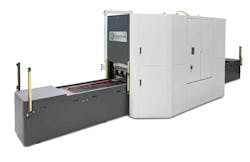QUINTUS TECHNOLOGIES has developed a new process that combines high pressure with a moderately elevated temperature, for more rapid, cost-effective, and precise forming of titanium parts. It said High Pressure Warm Forming (HPWF) paves the way for more widespread adoption of Ti-6Al-4V, a grade of titanium valued for its high strength, light weight, formability, and high corrosion-resistance.
The potential for Ti-6Al-4V parts formed by HPWF include applications in aerospace, medical, and marine sectors, according to Quintus Technologies CEO Jan Söderström.
“In the aviation industry alone, market projections call for close to 35,000 new passenger and freighter aircraft to be built over the next two decades,” commented Quintus Technologies’ Sture Olsson, global business development manager, Sheet Metal Forming. “These new models will consume less fuel and have a lighter environmental footprint. The lightweight properties of Ti-6Al-4V are integral to a fuel-efficient design strategy.”
HPWF removes barriers to fabrication that previously limited the use of Ti-6Al-4V to specialty applications, due to the high cost of current forming methods; conventional milling has a scrap rate that can approach 70% percent, Quintus noted; hot forming processes that take place at temperatures of above 1,300°F (700°C), require an oxygen-free process atmosphere, and involve several lengthy steps.
According to the developer, HPWF improves on those methods by introducing an induction heating system to warm the blank-and-tool package to approximately 520°F (270°C), which is well below the temperature where a protective gas would be required. After heating, the blank and tool enter the Quintus Flexform™ press.
The press applies uniform high pressure (20,000 psi/140 MPa) to a flexible rubber diaphragm, in conjunction with a single rigid tool half, to form complex sheet metal parts to final shape.
A complete HPWF cycle, from heating and loading to forming and unloading, takes less than five minutes. Forming at relatively low temperatures promotes quick cooling.
According to Quintus, the efficiencies generated by the new process "dramatically boost the production capacity for Ti-6Al-4V parts, increasing throughput by a factor of five over traditional hot forming processes."
Learn more at www.quintustechnologies.com
